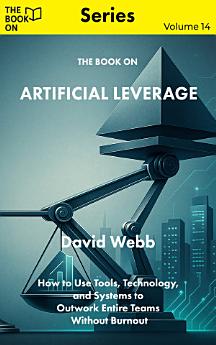The Book On Artificial Leverage
About this ebook
Most people hit the human-effort ceiling—too many tasks, too little energy, not enough hours. Webb argues the answer isn’t more grit but more architecture: systems, automation, and frameworks that let individuals perform at enterprise scale.
Inside, readers will discover:
Why energy, not time, is the true limiter of productivity.
How to shift from operator to architect by asking, “How can this run without me?”
The four multipliers of artificial leverage: automation, delegation, content, and AI-augmented thinking.
How to build invisible teams of systems that operate without burnout.
Frameworks like the Leverage Equation, Infrastructure of One, and the Systems-First Mindset.
Case studies of solopreneurs, creators, and founders who built sustainable performance through leverage.
This is not another productivity hack book. It’s a field manual for creating structural freedom. By mastering artificial leverage, you stop trading hours for progress and start designing systems that work when you don’t.
Because in the end, the future won’t belong to the busiest. It will belong to the best-leveraged.
About the author
David Webb is a seasoned entrepreneur and business leader with more than three decades of experience at the intersection of technology, finance, and services. As the founder and CEO of multiple ventures—some celebrated successes and some hard-learned failures—he has cultivated a reputation for turning complexity into clarity, driving growth, and leading organizations through periods of both turbulence and transformation. His career has been defined by a willingness to take calculated risks, embrace innovation, and pursue opportunities others often overlook.
David’s debut book, Life Unscripted: What You Should Have Learned in High School, distilled years of professional and personal experience into a practical guide for navigating the overlooked realities of adulthood. His second, The Book On Risk Management in Payments, marked a decisive step into specialized territory, tackling one of the most pressing challenges in global commerce: how to anticipate threats, safeguard trust, and manage risk in a world where money moves faster than regulation.
With his third book, The Book On Strategic Obsession: How to Turn Long-Term Thinking Into a Competitive Weapon, David advanced his mission further by exploring the discipline of sustained, long-horizon thinking as a defining advantage in leadership and strategy. Drawing from decades at the intersection of leadership, risk, and relentless execution, he reframed strategy not as a static plan on paper, but as an enduring obsession that separates fleeting achievements from lasting success.
His fourth book, The Book On High-Stakes Thinking: How to Make Decisions That Actually Matter, pushed into even more urgent terrain—the art of thinking clearly when the consequences are severe. Here, David dissected how individuals and organizations can cultivate mental frameworks that withstand pressure, avoid cognitive traps, and transform decisive moments into defining victories.
His fifth book, The Book On Artificial Leverage: How to Use Tools, Technology, and Systems to Outwork Entire Teams Without Burnout, reflects David’s conviction that the future of performance will belong not to those who grind the hardest, but to those who design intelligently. In this work, he explores how entrepreneurs, professionals, and creators can harness automation, AI, and systems-thinking to achieve outsized impact without sacrificing sustainability. Where his earlier works examined risk, strategy, and high-stakes decision-making, Artificial Leverage completes the progression by showing how to build enduring capacity in a world where human effort alone is no longer enough.
Beyond writing and business, David remains committed to mentoring entrepreneurs and contributing to community initiatives that promote education, resilience, and personal growth. Whether in boardrooms, classrooms, or in print, his work reflects a consistent theme: empowering others to think critically, act decisively, and build systems that endure.











